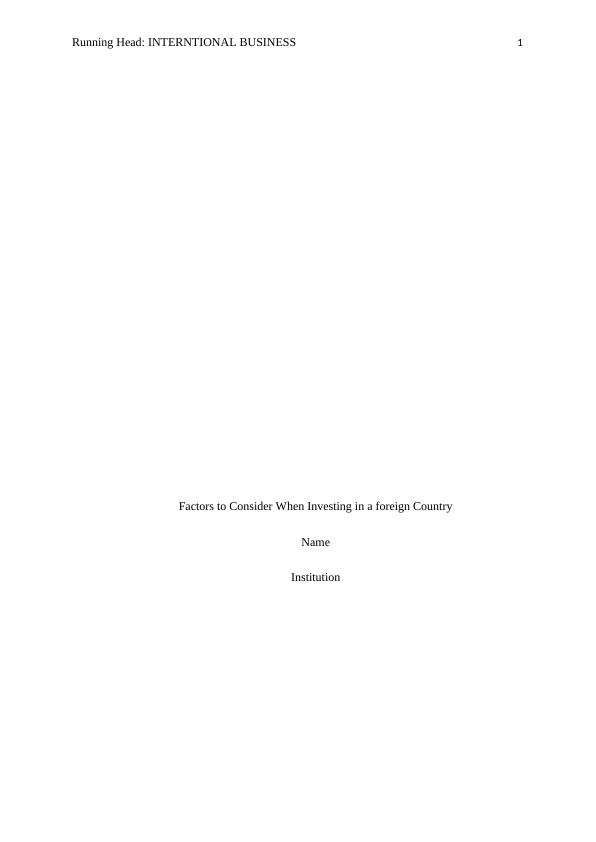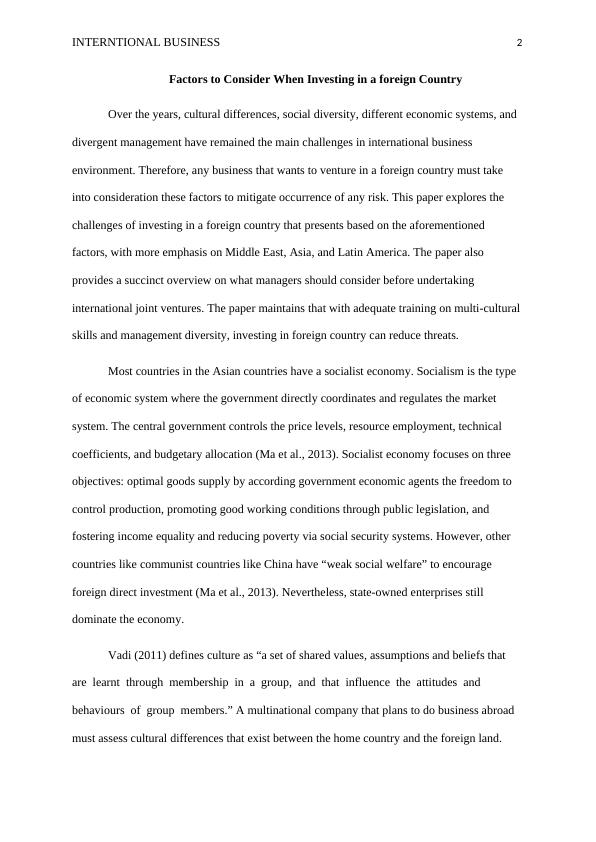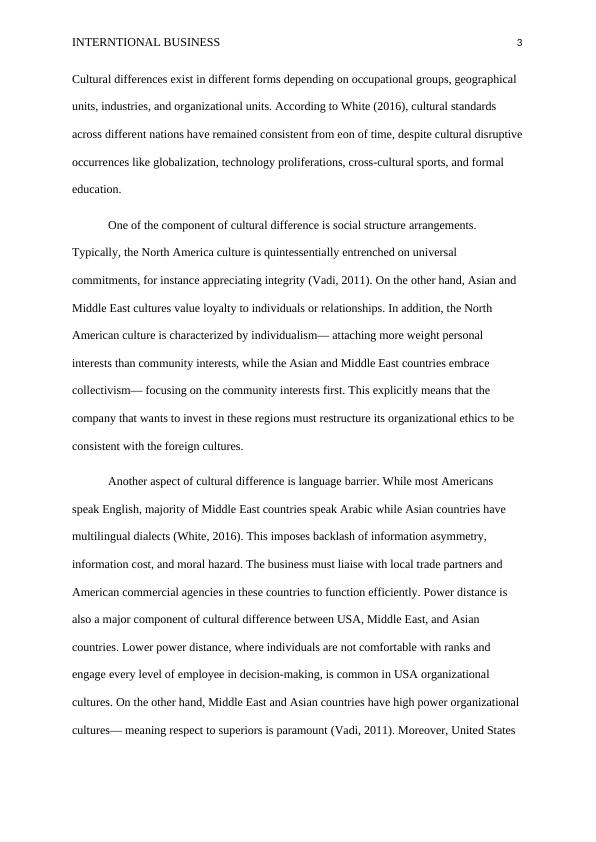Factors to Consider When Investing in a Foreign Country
Added on 2023-06-12
6 Pages1561 Words404 Views
Running Head: INTERNTIONAL BUSINESS 1
Factors to Consider When Investing in a foreign Country
Name
Institution
Factors to Consider When Investing in a foreign Country
Name
Institution

INTERNTIONAL BUSINESS 2
Factors to Consider When Investing in a foreign Country
Over the years, cultural differences, social diversity, different economic systems, and
divergent management have remained the main challenges in international business
environment. Therefore, any business that wants to venture in a foreign country must take
into consideration these factors to mitigate occurrence of any risk. This paper explores the
challenges of investing in a foreign country that presents based on the aforementioned
factors, with more emphasis on Middle East, Asia, and Latin America. The paper also
provides a succinct overview on what managers should consider before undertaking
international joint ventures. The paper maintains that with adequate training on multi-cultural
skills and management diversity, investing in foreign country can reduce threats.
Most countries in the Asian countries have a socialist economy. Socialism is the type
of economic system where the government directly coordinates and regulates the market
system. The central government controls the price levels, resource employment, technical
coefficients, and budgetary allocation (Ma et al., 2013). Socialist economy focuses on three
objectives: optimal goods supply by according government economic agents the freedom to
control production, promoting good working conditions through public legislation, and
fostering income equality and reducing poverty via social security systems. However, other
countries like communist countries like China have “weak social welfare” to encourage
foreign direct investment (Ma et al., 2013). Nevertheless, state-owned enterprises still
dominate the economy.
Vadi (2011) defines culture as “a set of shared values, assumptions and beliefs that
are learnt through membership in a group, and that influence the attitudes and
behaviours of group members.” A multinational company that plans to do business abroad
must assess cultural differences that exist between the home country and the foreign land.
Factors to Consider When Investing in a foreign Country
Over the years, cultural differences, social diversity, different economic systems, and
divergent management have remained the main challenges in international business
environment. Therefore, any business that wants to venture in a foreign country must take
into consideration these factors to mitigate occurrence of any risk. This paper explores the
challenges of investing in a foreign country that presents based on the aforementioned
factors, with more emphasis on Middle East, Asia, and Latin America. The paper also
provides a succinct overview on what managers should consider before undertaking
international joint ventures. The paper maintains that with adequate training on multi-cultural
skills and management diversity, investing in foreign country can reduce threats.
Most countries in the Asian countries have a socialist economy. Socialism is the type
of economic system where the government directly coordinates and regulates the market
system. The central government controls the price levels, resource employment, technical
coefficients, and budgetary allocation (Ma et al., 2013). Socialist economy focuses on three
objectives: optimal goods supply by according government economic agents the freedom to
control production, promoting good working conditions through public legislation, and
fostering income equality and reducing poverty via social security systems. However, other
countries like communist countries like China have “weak social welfare” to encourage
foreign direct investment (Ma et al., 2013). Nevertheless, state-owned enterprises still
dominate the economy.
Vadi (2011) defines culture as “a set of shared values, assumptions and beliefs that
are learnt through membership in a group, and that influence the attitudes and
behaviours of group members.” A multinational company that plans to do business abroad
must assess cultural differences that exist between the home country and the foreign land.

INTERNTIONAL BUSINESS 3
Cultural differences exist in different forms depending on occupational groups, geographical
units, industries, and organizational units. According to White (2016), cultural standards
across different nations have remained consistent from eon of time, despite cultural disruptive
occurrences like globalization, technology proliferations, cross-cultural sports, and formal
education.
One of the component of cultural difference is social structure arrangements.
Typically, the North America culture is quintessentially entrenched on universal
commitments, for instance appreciating integrity (Vadi, 2011). On the other hand, Asian and
Middle East cultures value loyalty to individuals or relationships. In addition, the North
American culture is characterized by individualism— attaching more weight personal
interests than community interests, while the Asian and Middle East countries embrace
collectivism— focusing on the community interests first. This explicitly means that the
company that wants to invest in these regions must restructure its organizational ethics to be
consistent with the foreign cultures.
Another aspect of cultural difference is language barrier. While most Americans
speak English, majority of Middle East countries speak Arabic while Asian countries have
multilingual dialects (White, 2016). This imposes backlash of information asymmetry,
information cost, and moral hazard. The business must liaise with local trade partners and
American commercial agencies in these countries to function efficiently. Power distance is
also a major component of cultural difference between USA, Middle East, and Asian
countries. Lower power distance, where individuals are not comfortable with ranks and
engage every level of employee in decision-making, is common in USA organizational
cultures. On the other hand, Middle East and Asian countries have high power organizational
cultures— meaning respect to superiors is paramount (Vadi, 2011). Moreover, United States
Cultural differences exist in different forms depending on occupational groups, geographical
units, industries, and organizational units. According to White (2016), cultural standards
across different nations have remained consistent from eon of time, despite cultural disruptive
occurrences like globalization, technology proliferations, cross-cultural sports, and formal
education.
One of the component of cultural difference is social structure arrangements.
Typically, the North America culture is quintessentially entrenched on universal
commitments, for instance appreciating integrity (Vadi, 2011). On the other hand, Asian and
Middle East cultures value loyalty to individuals or relationships. In addition, the North
American culture is characterized by individualism— attaching more weight personal
interests than community interests, while the Asian and Middle East countries embrace
collectivism— focusing on the community interests first. This explicitly means that the
company that wants to invest in these regions must restructure its organizational ethics to be
consistent with the foreign cultures.
Another aspect of cultural difference is language barrier. While most Americans
speak English, majority of Middle East countries speak Arabic while Asian countries have
multilingual dialects (White, 2016). This imposes backlash of information asymmetry,
information cost, and moral hazard. The business must liaise with local trade partners and
American commercial agencies in these countries to function efficiently. Power distance is
also a major component of cultural difference between USA, Middle East, and Asian
countries. Lower power distance, where individuals are not comfortable with ranks and
engage every level of employee in decision-making, is common in USA organizational
cultures. On the other hand, Middle East and Asian countries have high power organizational
cultures— meaning respect to superiors is paramount (Vadi, 2011). Moreover, United States

End of preview
Want to access all the pages? Upload your documents or become a member.
Related Documents
Cultural Exercise: Role of Culture on Attributionlg...
|4
|698
|422
Corporate Financial Management: Causes, Impact and Recommendationslg...
|13
|2937
|485
Company Analysis of BORAL Limitedlg...
|13
|3514
|52
Assignment On Communication Problemslg...
|10
|2263
|323
Drivers of U.S. Foreign Policy Assignmentlg...
|5
|1195
|278
SIX COUNTRIES PEST ANALYSISlg...
|11
|1678
|86
